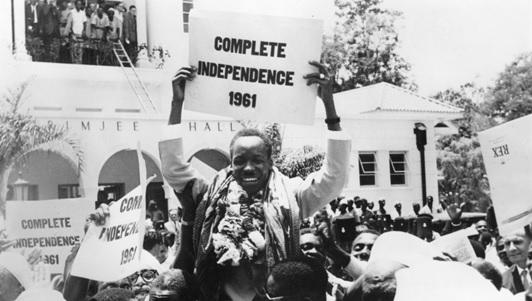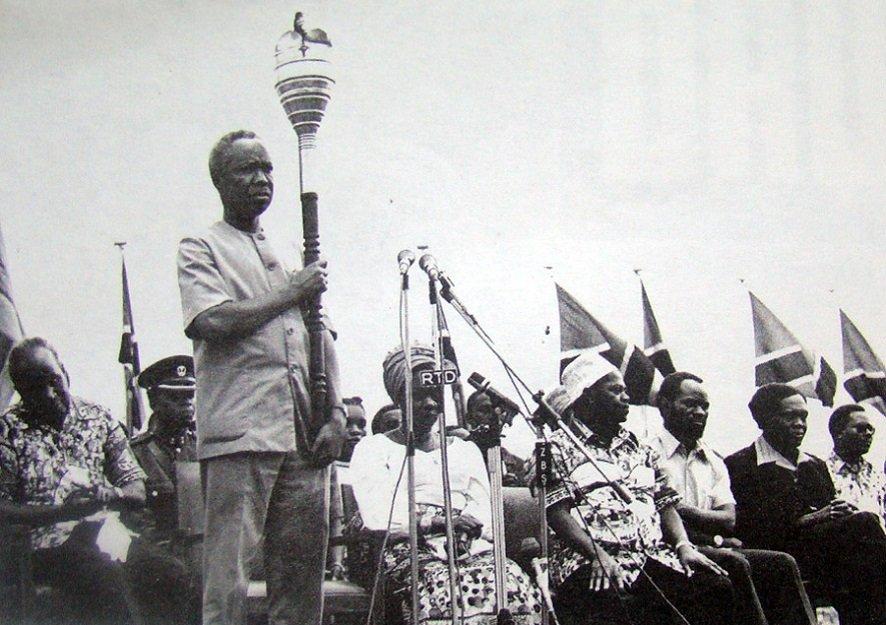At midnight on 9 December 1961, about 75,000 people gathered at the National stadium, representing the rest of Tanganyikans, to observe the birth of a new nation, which is now Tanzania The fresh green, black, and gold flag was raised to fly over the land, and the Union Jack was lowered for the last time in Tanganyika to mark the end of colonial domination. Until then, after years pass
This event was a big deal; it meant a lot to millions of Tanganyika nationwide. This was the day when the people of Tanganyika were taken back on 22 October 1959, when their visionary young leader committed on their behalf.

On that day, Mwalimu Julius Nyerere, addressing the Tanganyika Legislative Assembly before independence in a speech that came to be known as “A Candle on Kilimanjaro,” said, “We, the people of Tanganyika, would like to light a candle and put it on the top of Mount Kilimanjaro which would shine beyond our borders giving hope where there was despair, love where there was hate, and dignity where there was before only humiliation.”
This was a commitment made to prepare the people of Tanganyika. To set them to build a nation where there would be hope for everybody, love would be the order of the day, and dignity and respect for everyone regardless of their social or academic status.
It was a pledge of the struggle of m king our country a nation of free and equal citizens. Every person has an equal right and opportunity to develop himself and contribute to the maximum of his capacity to the nation’s overall development.
In line with those were the three common enemies of the newly born Tanganyika. These were poverty, disease, and ignorance. These were the challenges of the new nation, but also, there was corruption, which was added to the common enemies as another fatal enemy.
Nevertheless, the lowering of the union jack, the rising of a Tanganyikan flag, and the celebration at the nat on stadium and across the country were not the end. This was the beginning of the ti struggle to emancipate Tanzanians economically. Independence meant a new battle of settling the people of Tanganyika free from economic bondage. Mwalimu details why we fought for Independence in his message to TANU.
“We are celebrating victory. Yet it is essential that we remember even on that day that what we have won is the right to work for ourselves and design and build our own future. It is like obtaining land on which to build a house. To obtain that land against the opposition is a great thing, and it deserves celebrating, but the house does not appear during the celebrations; the house calls for more work, and even harder work, for the exercise of skill, sweat, and patience, if it is to be a source of pride to us, its owners.”
What Mwalimu meant was this; Bondage and oppression may have ended, but the dawning of the New Tanganyika and its future will largely depend on the commitment and hard work of the people of Tanganyika to build the nation of their ream.
That Independence is not a rose without thorns. Unless every Tanganyikan agrees to test his limits, move out of his comfort zones, embrace the risk, and work hard, we are destined to wallow in poverty even under the Tanganyikan flag flying over us.
We are celebrating six decades of our Independence. Looking down the road, we at least have something to show during the more than semi-century journey after Independence.
Somewhere along the way, we managed to build one united nation. We managed to play down tribalism, religiousness, academics, and segregation. Most important, under the administration of Mwalimu Nyerere, we were dedicated to the principles of human dignity and shared humanity.
However, as honest people, we cannot deceive ourselves that all is well because we are sixty-two years old as a nation. We congratulate ourselves for our effort and appreciate the determination and tireless effort of each individual who has worked selflessly towards this end. However, still, a lot lies ahead of us as a nation.
In the early days of independence, the then-young Tanganyika and later Tanzania leaders were burning with commitment and loyalty to serve their nation. They were looking forward with great hope to building a nation that would suit the need of the people who entrusted them with the affairs of their nation.
They demonstrated to the world that as young as they were, they were prepared to lay the foundation of the unit for their young state and wage the fierce war against poverty, disease, ignorance, and corruption.
Through the commitment of those young and true Pan-Africanists, we are proudly a nation. Without their devotion to their motherland, Tanzania, we are not sure where we would be today as a country.
This poses a challenge for us, the leader and citizens of today, as we start the new journey of another 40plus – years towards the turn of a century of our Independence. What future are we preparing for Tanzania and our grandchildren in the next four decades?
Can our present Tanzania leaders be faithful followers of the founding fathers of this nation to position Tanzania in the right lane that it travels safely and arrive, as per our dream in the next 40 years, so that when our great-grandchildren celebrate a 100th anniversary of their Independence, look back and feel proud of the work done for the country by their grandparents?
As a Chinese adage goes, a journey of thousand miles starts with a single mile. Now that we are beginning the ride towards 63 years of Independence, do we have a vision like the one in the minds of Mwalimu Nyerere and his colleagues after 9 December 1961 of building a united nation that we are celebrating today?
What is our vision for Tanzania for 40 years to come? Are we prepared to execute the mission for the better of the future sons and daughters of this great nation? Can the chawalism (uchawa) of the generation of today save this nation from downfall? Where is the fourth estate? Is it playing the role of noble professionals? Where are hot mind-pondering debates at the famous Nkrumah Hall? The list of questions is endless, whither Tanzania?
My compatriots, what candle are we lighting for the prospect of this nation? Lest we forget, “…the house does not appear during the celebrations; the house calls for more work, and even harder work, for the exercise of skill, sweat, and patience, if it is to be a source of pride to us, its a need.” Yes, we can always expect to reap where we sow.


[…] DRC and Burundi, the just-ended tensions between Rwanda and Uganda and the business tensions on Tanzania – Kenya border are not good signs on our course towards Agenda […]